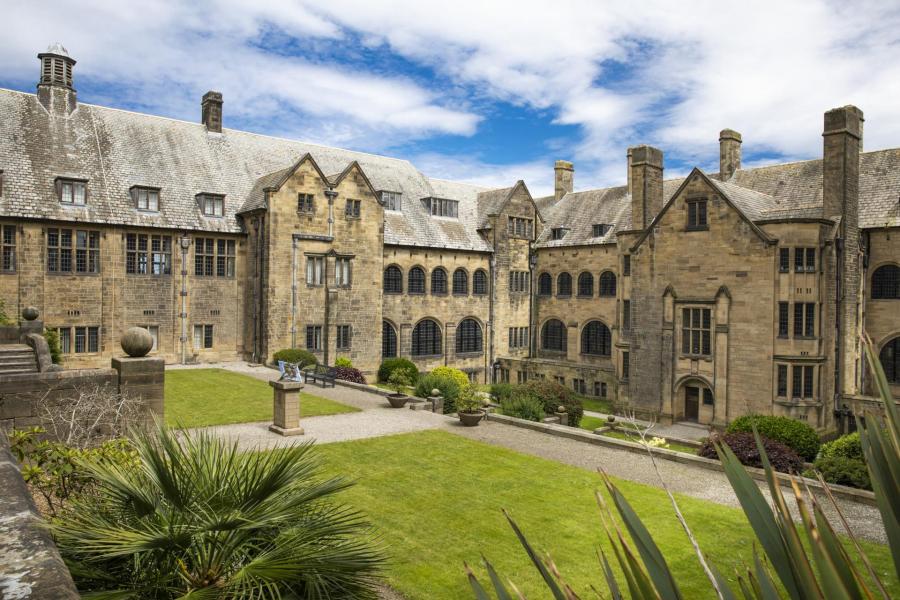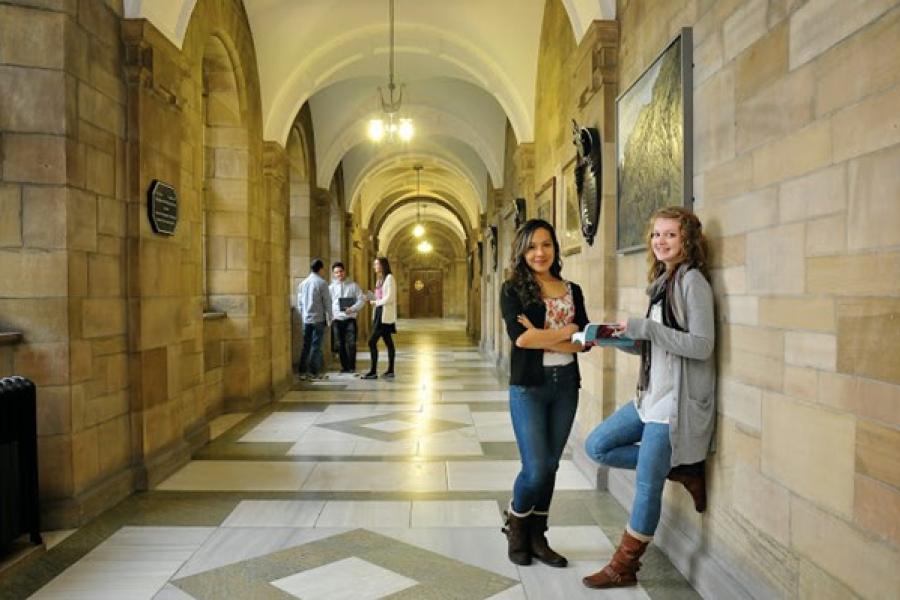About Us
The Research Committee on the Sociology of Law (RCSL, https://rcsl.hypotheses.org/) is part of the International Sociological Association (ISA) and on this occasion hosted by Bangor University. Founded in 1884, Bangor is a medium-sized research university in a small city surrounded by an area of outstanding natural beauty. The School of History, Law and Social Sciences (link: https://www.bangor.ac.uk/history-law-social-sciences) has a special focus on socio-legal topics. One of the earliest universities in the United Kingdom to offer criminology degrees, Bangor has now also made a name for police studies. Law at Bangor has historically started from within the social sciences. The latter here at Bangor also include sociology and social policy.
The local organisation committee consists of members of the School of History, Law and Social Sciences:
- Professor Stefan Machura
- David Ashworth, MA
- Dr Rhian Hodges
- Dr Lucy Finchett-Maddock
- Anna Monnereau, LLM
- Lois Nash, LLM
- Isabel Linton (College of Arts, Humanities & Social Sciences)
More Information
RCSL webpage:
https://rcsl.hypotheses.org/
Websites of co-sponsoring associations:
Vereinigung für Recht und Gesellschaft: https://rechtssoziologie.info/en/german-association-for-law-and-society/
DGS-Sektion Rechtssoziologie: https://soziologie.de/en/sections/sociology-of-law/portrait
Journal of Law and Society and Centre of Law and Society at Cardiff University: click here
For the Cardiff institute - https://centreoflawandsociety.co.uk/
Centre for Socio-legal Studies, Oxford University: https://www.law.ox.ac.uk/centre-for-socio-legal-studies/centre-socio-legal-studies
Associazione Italiana di Sociologia - Sezione Sociologia del diritto -- https://www.ais-sociologia.it/sociologia-del-diritto/
Other organisations:
The RCSL conference at Bangor in 2024 is endorsed by the Socio-legal Studies Association: https://www.slsa.ac.uk/
The Oñati International Institute for the Sociology of Law will organise panels for its students at the conference: https://www.iisj.net/
The Oñati Community will organise an Oñati Dinner during the Conference: https://onatiblog.hypotheses.org/80
Registration
Registration
All presenters and participants must register for the conference.
“Early bird” conference fees apply until 30th of June 2024.
Conference fee includes catering. Conference dinner and tours are optional extras. Accommodation has to be booked separately.
|
Delegate category |
Early bird |
Standard |
|
Non-members high income countries* |
£400 |
£480 |
|
Members of RCSL and of co-sponsors** from high income countries* |
£350 |
£390 |
|
Non-members other countries |
£310 |
£350 |
|
Members of RCSL other countries |
£290 |
£320 |
|
Students/persons without employment |
£260 |
£300 |
* As per World Bank report: https://blogs.worldbank.org/opendata/new-world-bank-group-country-classifications-income-level-fy24
** Co-sponsoring associations and institutions: Vereinigung für Recht und Gesellschaft; DGS-Sektion Rechtssoziologie; Centre of Law and Society at Cardiff University; Centre for Socio-legal Studies; Oxford University, Associazione Italiana di Sociologia - Sezione Sociologia del diritto
Cancellation policy: Delegates cancelling after 1 July 2024 will receive a 75% refund of the conference fee. No refund for cancellations after 1 August 2024.
Call for Papers
Call for Papers
Law is an abstract concept that requires representation in everyday knowledge and opinion, in theories, as well as representation within professions such as judges, lawyers, police and other officers, and not least representations in architecture and even products of popular culture. This applies in whatever ways we understand law: as a specific social system (Niklas Luhmann), as a distinct area of legal expertise, as law-in-the-books, or as “living law” beyond state law (Eugen Ehrlich).
“Representing law”, the theme of the RCSL conference in Bangor (Wales/UK), from 3 to 6 September 2024, is a cross-cutting topic for sociologists of law and others interested in the analysis of law in society. Lay-people and the legally trained alike have implicit and explicit ideas about the law that guide their actions, from everyday economic interactions to political engagement. Some of these are influenced by training at school or university. Not only lawyers receive such training, but also thousands of managers in business, and state servants such as social workers, even if theirs is concentrated on aspects of the law. Employee representatives will learn about law from their workers’ unions. The media circulate images of law, be that accurate in a lawyerly sense or rather not. Some of this is part of political struggles, when for example a newspaper declares judges as “enemies of the people” for their ruling in a high-profile case. For centuries there is with every new media development a concern that people are misled and manipulated. The latest are issues with social media, the filter bubbles it creates, the extremism social media algorithms cultivate. In contrast, many observe that media cling to conservative messages and are becoming effectively mouth-pieces for existing institutions and interests.
Nevertheless, media messages need not be evaluated as negatively necessarily. Fictional portrayals of law, of legal professions and institutions often suggest that they can indeed be trusted to some extent at least and they suggest legal reforms or better practicing of law. For example, lawyers should not be guided by economic self-interest, or judges and prosecutors not by political ambitions. Aesthetic and representational understandings of law may guide people as to what law means for them. In addition, personal experiences and those of trusted others like family and friends may be very decisive for how people are imagining law.
Scholars of law and neighbouring subjects have investigated law from different perspectives and dealt with it differently in their teachings. For some, law is to be harnessed as a force for social change, to strengthen the position of e.g., employees or of victims of crime. Others value the law especially because it provides a system of checks and balances for political power. For example, law can prevent administrations from interfering with individual rights. Scrutiny has been applied to the grass-roots usage of law, how members of society unite or differ in their legal actions. Prominent are also analyses of apex courts and other high-level legal institutions, as well as the ways in which they proceed. Theories of law highlight social, political, and economic inequalities which are produced by law and reproduced in law, but also the potential for reform presenting itself through law. Successful examples for the latter include the championing of human rights. Other analysts have pointed out how procedures and daily routines in legal institutions have consequences for the application of law, and even self-legitimise the law (Luhmann). Theories of law have become powerful ways of representing law.
Who speaks for the law? Who decides legal conflict and provides legal advice? Who is best placed to adapt law to changing social conditions? Such questions also form part of the conference theme. In some ways, the legally trained and especially those in legal offices, are privileged interpreters of the law, at least in modern states relying on a differentiated-out legal system. This raises issues of legitimacy and of democratic representation. Critics question why graduates of leading universities, those with long family tradition in law, why males rather than females in high legal offices, are still dominant. Some social groups are underrepresented in law, and some are described as discriminated against by holders of legal offices. This may affect national minorities and those discriminated on “racial” and ethnic grounds. The economically marginalised can suffer from further disadvantages inflicted by the way the law operates.
Representations of English and U.S. law are more prominent than representations of other legal systems. On a very basic level, it follows from English being the language of global communication and commerce. The U.S. media industry has cultivated a world-wide market of ideas, notions of U.S. law and legal institutions travel in every corner of the world with popular TV shows, film, and other cultural products. For better or for worse, international audiences may learn about a law that is not the one prevailing in their home country. On a different level, in academia, concepts and perspectives from the common law countries are often reaching wider than those from countries with other legal arrangements, social and political backgrounds. The RCSL conference provides an opportunity for academics from countries with different histories and systems to exchange their ideas and to enrich their own thinking with insights from joint discussions.
Bangor University, hosting the RCSL conference in 2024, is located in a Welsh-speaking area and the conference offers the opportunity to discuss as one of the strands issues around bilingual provision of legal services. Local courts proceed in Welsh and English. Welsh speakers can have all legal communication in their mother tongue. Other countries are discussing to develop a similar service for minorities and the conference offers a unique opportunity to learn about bilingualism in the legal sphere.
As demonstrated, the conference theme “Representing Law” covers a wide area of academic interests. However, the RCSL working groups are invited to organise their own panels on whatever topics they want to discuss, as well as their business meetings. Invited are also single papers on topics of sociology of law / socio-legal studies.
In addition, the Journal of Law and Society (JLS) and the Centre of Law and Society at Cardiff University as co-sponsors of the conference are organising a stream/session on socio-legal studies in Wales and the UK and invite young colleagues to submit their papers to this stream. The Journal will support selected paper presenters with their conference fees. Details of how to apply will be announced in due time on the conference homepage.
Please submit proposals for papers, panels of papers and roundtables using the appropriate link below. Extended Deadline: 3 March 2024.
If you have co-authors, co-panelists etc., your submission indicates that they have agreed to be part of the proposal and to be contacted if necessary.
Delegates are limited to presenting one paper (as main presenter). The programme committee reserves the right to add individual papers to panel proposals when necessary and where they fit. Panels can have between three and five paper presentations. You will be notified in March/April 2024 if your paper, panel or roundtable is accepted. All contributors need to register for the conference after notification that they are on the programme. Many thanks for your proposal!
Link to form: Paper proposal
Link to form: Proposal of a panel of papers
Link to form: Proposal of a roundtable
Programme
A draft programme is available here
Accommodation
On campus Accommodation is available at both the University Halls (Conference Accommodation) and at The Management Centre.
To book a room in the halls accommodation please visit this website and input one of the following codes when making your booking:
- Bed and Breakfast stay @£50 per night - RCSL24B
- Room only stay @£40 per night – RCSL24S
The Management Centre is graded as Visit Wales 4 star Guest Accommodation and offers 56 en-suite guest bedrooms. Many of the rooms have stunning views of the Menai Strait and Anglesey. All guest bedrooms are en-suite with complimentary tea and coffee making facilities and digital flat screen televisions. Room rates for September 2024 are:
- Single: £104
- Double (single occupancy): £114
- Double (double occupancy): £127
- Executive/Twin/Family (single occupancy): £135
- Executive/Twin/Family (double occupancy): £148
Availability is limited so if you would like a room on the discounted rate you will need to book as soon as possible. Please quote this booking reference when making your booking for the Management Centre - GA01657. To book your room please email - groupsthemanagementcentre@bangor.ac.uk
Alternative Accommodation
North Wales is a prime tourist location so there is also a wide variety of B&Bs, hotels, holiday homes and camping sites on offer.
For general accommodation inquiries: www.visitwales.com
Exhibition
As part of the 'Representing Law' Research Committee on the Sociology of Law (RCSL) Conference at Bangor University 3-6 September, we are hosting an exhibition on the theme of Representing Law, for conference delegates as well as local artists. This will be a photography exhibition of submissions from delegates, as well as mixture of works of different media from the local community.
The exhibition will take place in Bangor Pontio Arts and Innovation Centre, from 3-29 September.
We would very much like local artists and their work to be a part of the exhibition, and submit work that they feel talks to the theme 'representing law'. This could be an obvious reference to some of law's more common motifs such as scales, Lady Justice, the police, protests, the prison, etc., to something more abstract and personal that may give an 'affect' of law, which may speak to your work, criminological and legal theory, and concerns of social justice more broadly.
We invite submissions at outline stage via the link below, with a title and brief summary as to why this has been chosen. Any medium, painted, print, sculpture, video, sound, illustration, etc., is welcomed.
The deadline is 30 June 2024. Please send any queries regarding the exhibition to Lucy Finchett-Maddock (l.finchett-maddock@bangor.ac.uk) or any other queries to the conference team more broadly.
We look forward to receiving your contributions!
The submission link is:
Representing Law Exhibition - Call for Local Artist Submissions Deadline 30 June 2024
Travel
Travel to Bangor is straight-forward as it is located by a main train line from London and the A55 express road. The nearest airports are Manchester, Liverpool, and Birmingham; the first mentioned is a 2 hour drive from Bangor. Regular ferries connect the nearby harbour of Holyhead with Ireland. (Link to travel information: https://www.bangor.ac.uk/international/support/trips/travel).
The conference will be in the historic main building of Bangor University, offering a lot of atmosphere and views of the mountains of Snowdonia and of the Menai Strait. Our by-programme will have guided tours and cultural events are also planned. For a short break from sessions, there are cafés, green spaces, and the temptation to enjoy stunning views from the Bangor pier within walking distance.


Images by Stefan Machura of Welsh Highland train leaving Porthmadog Station and Mount Snowdon seen from the Menai Straight.
You may want to consider an extended stay in the area. The counties of Gwynedd, Anglesey and Conwy offer a wide range of tourist attractions. Caernarfon and Conwy, for example, are historic walled cities by the sea. The small seaside town of Beaumaris on Anglesey, offering spectacular views of the Menai Strait and the mountains of Snowdonia, is popular with tourists and, more importantly perhaps for socio-legal scholars, has a historic court museum and a prison museum. Here, you can learn about crime, law, and punishment in past centuries.
North Wales offers the combination of seaside and alpine mountains. Up Mount Snowdon is a popular walk, rewarding the hardy with a lasting experience. The less physically fit can take the narrow-gauge train to the summit. Railway fans will be able to spend days travelling on steam-hauled trains in North Wales if they wish so. At the foot of Mount Snowdon, the town of Llanberis has an excellent slate mine museum, exemplifying work and living conditions in the industrial past. Beaches and dunes stretching for many miles invite the keen walker. A coastal path leads around Anglesey and mainland Wales. Sea birds, grazing ponies and – with luck and depending on the location – sea turtles, seals and dolphins can be spotted.
Combining the 2024 Bangor conference with a holiday is also a good option for families. Kids and those young at heart, can find attractions such as the Sea Zoo or the Tacla Taid Anglesey Transport Museum. The boat ride to Puffin Island from Beaumaris is also tempting.
Bangor 2024 is bound to be a conference not to be missed, with something for everyone!
Bangor University, Main Arts Building


